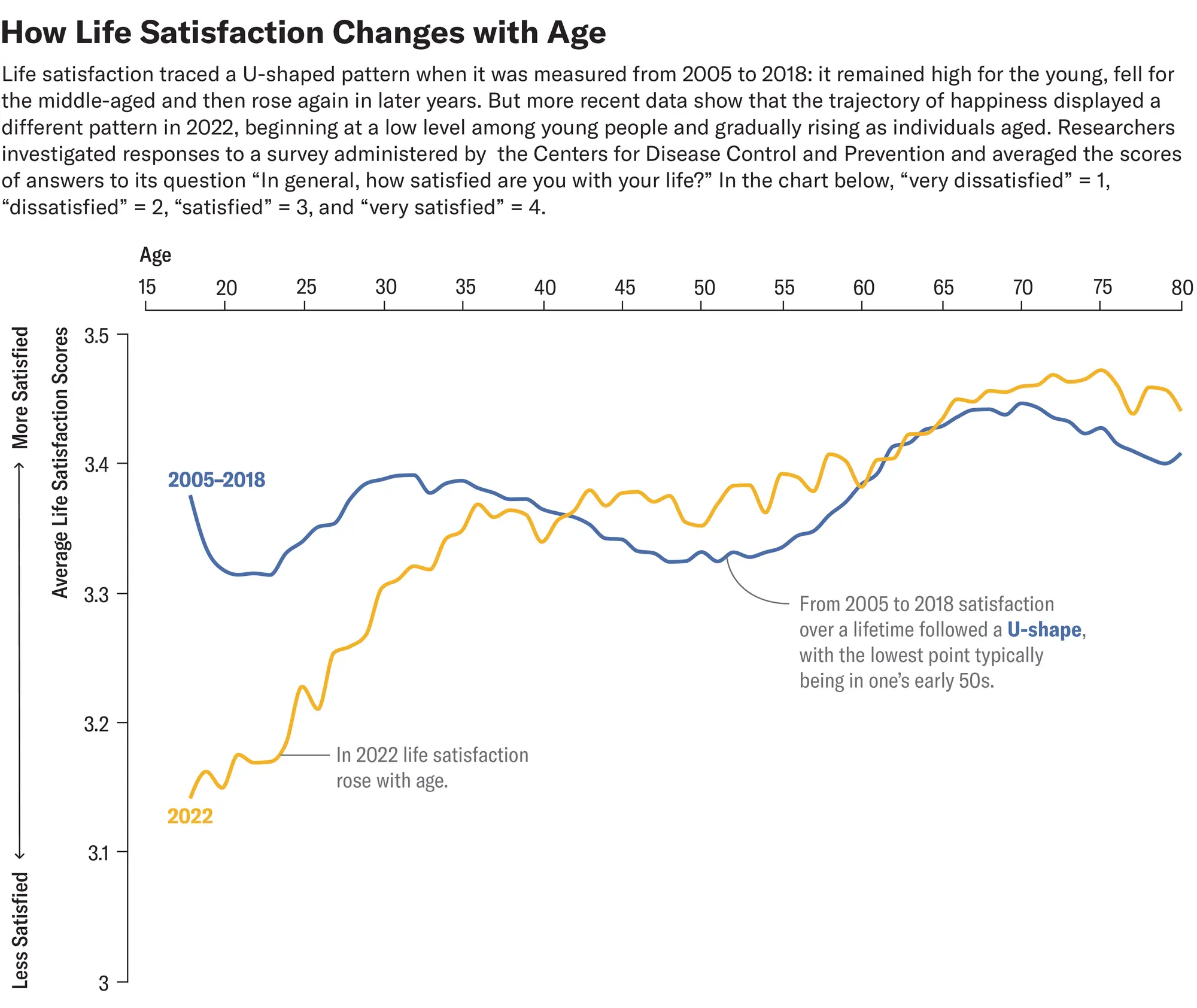- cross-posted to:
- collapse@slrpnk.net
- cross-posted to:
- collapse@slrpnk.net

I stop blaming the phones. It’s tuition and student debt, coupled with *waves hands* all of this.

It’s the lack of perspective. There’s nothing to work or live towards.
I’m in my early thirties and grew up in the last years of the “it’s getting better” time, but nowadays it’s all gone.
The political system in all of the West is ossified and unable to solve any of the real problems. Society is dominated by a gerontocracy. The economy is fucked for almost all participants, except the very few at the very top.
My generation will not have better lives than our parents. And there’s absolutely no hope for it to become better . In fact, it’s likely getting way way worse for most of us.

Please read wonky news, vote, and tell your friends and neighbors about the stuff you learn about candidates. We get crappy government by voting for it. We could fix the government if we elected people who would write legislation to stop corruption, was there to fix roads and balance budgets rather than scream about triggering issues, and wanted to make a better rather than to simply ‘win’ no matter the price.

I already do vote and try to convince people around me, but here in Germany, the reality is that most people are old and stubborn (average German is 44, average voter even older) and the propaganda of the last decades worked.
Some still believe in trickle down and neoliberalism, some started believing Russian propaganda and are convinced that only right extremists can rescue us.
But that’s exactly the situation I’ve described above. You see the ship steaming onto the rocks, but ⅓ of the crew thinks, that’s fine since it worked so far, ⅓ denies the rocks even exist and the last ⅓ is convinced that rocks are actually an opportunity for growth.

We get crappy government by voting for it.
Yep, and our choices are Sideshow Bob or Grandpa Simpson. Vote wisely.

Okay, but part of it is phones. Not in like, a ‘kids are always staring at their phones’ sense, but in terms of the ease of communication changing the social landscape.
When I was in my late teens and early 20s, if you wanted to go hang out with someone, you’d go downtown. You might run into the person you were looking for, you might run into someone completely different and have some crazy unexpected adventure, but it mostly happened in the same place. Even with old flip-phones, they facilitated communication but they didn’t derail or substitute it.
Want to see what someone’s doing now? You can immediately message them and either know they’re free or busy or that they’re not responding. And yeah, you could call somebody’s phone, but it was different. There was little incentive to keep a phone charged once you were off with your friends, and those early batteries did not last! I remember my mom giving me shit about never having a charge in my phone when she’d try to call me.
Every day was an unexpected adventure. Very little of it was planned beyond ‘go hang out in town’, but every day was something different. Once all my friends were on social media and carrying smart phones, it changed dramatically. I didn’t have to either go find someone or talk on the phone if I wanted to check in, I just have to message them. There’s no need to go have an adventure to just say ‘hey, what’s up?’. There’s no built-in incentive to team up and go find something to do the way there was when I had to physically get to someone to hang out.
And yeah, we can still make plans, but that’s different. ‘Plans’ were always there, just as something special and organized, but the default was just hanging around. I don’t feel that anymore in the same way. It’s still there, to some extent, because I see some younger folks hanging around, but not in the numbers we had. Plans require planning and come with some pressure that just seeing people around town never did.
I think that need to go out and run into random people in order to have a social experience gave us something that we’re missing now.
Also, like, we know a lot more now. We can see how screwed up humanity is. We know that a lot of our food is the direct result of dystopian sci-fi level torture of entire species. We know that the richest people are happy to light the world on fire to make a buck and that our measures for stopping them have so far not been as effective as we kind of need them to be. We know a lot of the horrible shit people have been doing to one another behind closed doors, and even out in the light of day.
We know a lot more about everything, but we haven’t really had the time to heal from it as a society or even really fully process it all, let alone change it. Given the limits of youthful autonomy until adulthood, it’s hardly surprising that it’s kinda distressing being stuck in the back seat of a car that’s careening toward a cliff while the previous generation’s driver mindlessly stares at a Facebook meme about kids be on their phones.
The whole thing is a mess, and younger people are right to be distressed about it. But technology and our struggle to adapt to it is part of that mess.

The problem is global and started in 2014. Student debt isn’t an issue in many countries.
Social media seems like the most obvious one to me, if you look at popularity graphs of the various sites it seems to line up pretty well.
Gen Z and A even have a term for it - “brain rot”. If you go down that rabbit hole of memes, it becomes obvious there’s a lot of self-doubt, confusion and angst among that generation, with weirdo influencers impacting their thinking in fairly deep ways.

2014 was the year of gamergate and Russian conspiracy theories about the downing of MH-17.
Make of that what you will.

Why do you think it started that late? I’m pretty sure it started well before then.

It’s mentioned in the article.

To be fair, it’s also the phones.

as someone approaching my 30s in america this sounds consistent with both my experience and many of my peers. our education system is more or less a trauma machine, and couple that with the demise of “third places” (places that aren’t school or home for kids to hang out in without having to spend money) and the general state of the world being hard for even adult minds fo wrap around… our world is a difficult and unpleasant place to be a kid. it ain’t a cakewalk being an adult either but it is relatively better with a relative increase in agency and more experience dealing with everything

The loss of 3rd places as you mentioned is huge. When I was a kid we at least had malls, where you could still hang out and roam about without having to actually buy anything. Nowadays, there’s next to nowhere to just exists without spending money (unless you live outside of cities/suburbs).

I lived outside of cities/suburbs, and there was nowhere to hang out either.

I believe that Mr. Galloway addresses most of the problems in his Ted Talk: How the US Is Destroying Young People’s Future | Scott Galloway | TED
I’m just seeing this for the first time, and I can’t really disagree with his data

Actually, the article didn’t say young people were doing worse. The reason that youth is no longer one of the “happiest times” is because the study showed that people only do better and better as they age. So where before your youth would be comparatively happier to your mid-life crisis, they’re saying we just get happier and happier into midlife and old age.

This pattern is driven by an increase in unhappiness among young people both in absolute terms and relative to older people.
also look at the graph in the article, the yellow line representing 2024 is signifigantly lower before 35 than any point on the blue line representing 2005-2018

That sounds the same as it was for Millennials.

As a person who’s not a young adult anymore I’m not sure how or if it ever was. My young adulthood was full of angst, rumination, poverty, debt, etc. Looking back there were definitely good things that I miss, but I’m in such a massively better financial and mental place these days that I can’t imagine going back.

Don’t forget five to seven hours of homework a night.

Why are you doing 7 hours of homework as an adult?

College. But fine to seven hours every night is absolutely an exaggeration.

Middle aged ain’t much better.

my young adulthood was the happiest i had ever been; being middle aged sucks.

Facts.

I think my 30s would have been great if I hadn’t developed horrible, genetic, chronic medical conditions basically as soon as I turned thirty.

Yet another opinion piece to remind me that blocking posts by domain can’t come soon enough.

“Opinion piece”? Did you read it?

Did you? Sure, it quotes a study, but its otherwise a bunch of quotes from one of the study authors, an author who has a definite idea of what to blame:

Smart phones, and nothing else. Let’s hope he’s better at conducting studies than he is at staying abreast of current events, but yeah, this non-sense is close to cream-of-the-crop for the
Scientific Americanlivescience.com “articles” that are always cluttering my Lemmy feed. Okay, so I confused one site for another, but we should demand better of more respectable sites, as well as round-filing the utter garbage.
This is my main issue with this type of journalism as well. The one author of the paper comes off as flippantly myopic and that’s partially due to the way the article itself is written. If dude doesn’t have a really informed view of the underlying causes of the data being observed, don’t just throw some dumb quote he pulled out of his ass into the article lol.
It’s increasingly difficult to find articles that pose deeply thought out questions and analyses when every writer is pressured to produce something that satisfied their editors’ want for a story with a quick answer that doesn’t rock the boat or upset shareholders.

Could be worse. Could be an Elsevier site (Lancet, Cell, ScienceDirect, etc.).

It literally says “We don’t fully know yet, but this is what we think in the meantime with what we do know”. I mean, the first 5 words in your screenshot are “There is no definitive consensus”, which is a far cry from “smart phones, and nothing else”. I’m not sure what exactly is wrong with that, or how that falls into “opinion piece” territory.

No, dude literally said at the end that he had no idea what else would be the cause. That’s a pretty damn strong opinion in the face of everything that’s happened in recent decades.

ITT: A bunch of folks who didn’t read the article.
The article didn’t say young people were doing worse than before, which it seems like all of you assumed.
The reason the study found for why youth is no longer one of the “happiest times” is because they showed that people only do better and better as they age. So whereas before your youth would be comparatively happier to your ‘mid-life crisis’, they’re saying that crisis doesn’t occur anymore and we just get happier and happier into midlife and old age. So your younger days didn’t get worse, they just aren’t as great in comparison because the rest of your life gets so much better as time goes on.
Sounds crazy, I know. But that’s what the article was actually saying.

That’s part of it, but the charts also show higher despair and lower satisfaction among younger people. For example:


Never experienced that so-called ‘happy’. What is it? Is there still some left?

It’s this thing that lots of money gets you.

Yeah, no

“No longer”? I’m still waiting for the happy.

There is no definitive consensus on the driver of the decline in happiness and rise in unhappiness among young adults, though Blanchflower believes the trend is driven by cell phone and social media usage. “What you need here is something that starts around 2014 or so, is global and disproportionately impacts the young—especially young women,” he says. “Anybody that comes up with an explanation has got to have something that fits that. Other than cell phones, I don’t have anything.”
Regardless of the cause, however, “this is a global problem,” Blanchflower says. “We’re past the point of measuring. We should be out doing pilots, trying to figure out what might work. We should be trying to come up with solutions… Tell me what we can do to help these young people who are in trouble.”

Lol this dude sounds super out of touch. There are a whole lot of societal and economic factors around the '00s and '10s that are likely contributing.
Fuggin’ “cellphones” sounds like a typical boomer answer.
Also, there is likely some lag time between a population’s perception of traumatic or disturbing events and the onset of despair. I know that learning more about the financial crises around the late '00s did not help my mental health and only really occurred some time after in the mid '10s as people had time to analyze the root causes of these issues.
The continual deathmarch of climate change, growing awareness of the exploitation of the working class, and the reactionary violence and hate bred by right wing fanatics and politicians which surged beginning in the early '10s are all contenders for massive, culturally debilitating, trends. Lol “cellphones”.
Smart phones and social media are obviously amplifiers of these issues and are part of the problem, but the quote is remarkably reductive and does not address the root cause of what makes the information communicated through cell phones and social media so disheartening. Maybe we are given poor context for the quote and maybe it was something Blanchflower said in passing during the interview, but, still, not a good look.

You act like social media is just providing access to the unfortunate state of the world rather than using manipulative algorithms to drive engagement by only showing the most inflammatory content. Whether it is technically factual or out right misinformation it only shows that which creates a strong emotional response thus only showing the worst the world has to offer. The fact you believe that is reality just goes to show how effective it is at creating despair.

Absolutely. I totally agree that social media is a manipulative lens based on those engagement algorithms. I definitely see that as having amplified these issues (and in many cases, misrepresented and confused, as you said, which also drives despair and conflict).
I also didn’t mean to sound extremely dour in the first place, there are, of course, some aspects of society and progress worth celebrating, and I’m not particularly unhappy, so much as worried for others, myself.
The reality and perception of existential threats like climate change, violence, and exploitation is no doubt amplified by the lens of social media, but I would argue that those pressures would still be felt, regardless of that amplification, leading me to see them as the root causes.
I also agree that social media in general is another root cause, but argue that just throwing that out there as “the” root cause, as Bellflower does in his quote, is reductive and looks out of touch.

Perhaps I misinterpreted your comment. You are correct that thinking the world would be perfect without social media is pretty juvenile thinking.

Funny, no mention of late stage capitalism

I don’t know if people have just gotten meaner over time or if that is how it has always been, but there are a lot of people who are very unpleasant to interact with, both on and off the internet. It can be stressful trying to interact with new people because it’s a dice roll on whether they’re friendly or condescending.
Anyway, just my observation. I don’t know if that has anything to do with social media, but it wouldn’t surprise me I guess.

A lot of environments on the internet basically reward hostility. Any kind of engagement gets stuff promoted in the algorithms, including negative engagement, so anything the starts a fight gets put in front of everyone else. That’d mean that people are more likely to see hostile people regardless of whether there are actually more of them than before
That only accounts for online interactions though, so maybe it’s not as strong an explanation as I think if offline interactions are similar

Offline, I’ve seen an increase in hostility after the pandemic. Mainly, people just being rude or outright hostile to each other in public. Completely anecdotal, of course, but it was less common prior to the pandemic and all of this weird political landscape.

I would like some of that “happy” please. It sounds nice

The worst part is the title is probably wrong.

“The
Industrial Revolution[Internet] and its consequences have been a disaster for the human race. They have greatly increased the life-expectancy of those of us who live in “advanced” countries, but they have destabilized society, have made life unfulfilling, have subjected human beings to indignities, have led to widespread psychological suffering (in the Third World to physical suffering as well) and have inflicted severe damage on the natural world. The continued development of technology will worsen the situation. It will certainly subject human beings to greater indignities and inflict greater damage on the natural world, it will probably lead to greater social disruption and psychological suffering, and it may lead to increased physical suffering even in “advanced” countries.”
He wasn’t wrong. He was just an asshole.

Weird article. I think if in your middle aged years you are the most unhappy, its because you have not made the right decisions for yourself. Too many people chase the things they are told will make them happy rather than what they like and know made them happy. Doing what you are “supposed” to do. Alternative paths have their hardship but for me at least, I don’t have the kind of complaint I hear from others. You always have to make some kind of compromise…

It is also the time in people’s lives where they have the most responsibility. Even if you’ve made the right choices in life, that’s when people are their busiest.

But my point is that, that is due to one’s choices. You don’t actually have to get married, have kids, get on the career treadmill. But also some do not even get to have these choices, so have no choice but to follow a non-traditional path. People with disabilities, people who living in places where they are displayed due to political instability, poverty, war etc.
Someone growing up in Ukraine right now, probably wont consider this to be the happiest time in their lives. A person with a disability struggling to establishing independence over even basic life activities. People who just say f–k it.


